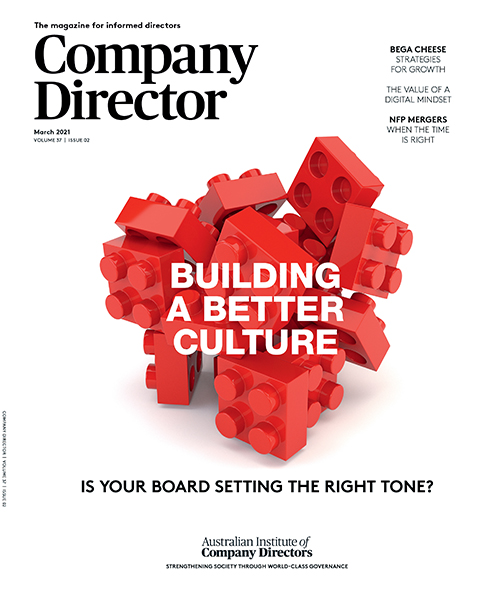Ethical considerations in decision-making underpin good governance.
In Reasons and Persons, Derek Parfit argued that a person who always acted in their own interests was self-defeating — there would be outcomes preferable to that person that would only be achievable if at some point they did not act in their own interest. It is an argument that directors are contemplating for their organisations as much as for individuals. The sustainable pursuit of growth is a concern for society, and for any organisation.
Ethical considerations in decision-making underpin good governance. Considering issues of principle is inherent to directors’ duties. As we set out in the foreword to the AICD’s Ethics in the Boardroom — A guide to decision making, released in conjunction with The Ethics Centre, directors are bound by fiduciary and statutory duties, including the duty to act in the best interests of the organisation. Ethical board decisions align with the duty to act in the best interests of the organisation as a whole, taking into account different stakeholder perspectives.
Ethical decision-making does not sit solely with the board, of course. In any organisation, decisions that impact stakeholders will be made at every level from the board to front-line staff — every point of customer contact, complaint or community engagement. How we work together in an organisation as colleagues sets the tone. The board does have a clear responsibility to establish the principles and values that embed ethical decision-making in the organisation’s culture and then focus resources and incentives to consistently do the right thing.
The challenges of COVID-19 cast into sharp relief the importance of ethics in decision-making. Health and safety dominated our priorities. We have an ethical commitment to protect staff and customers above other considerations. Beyond that immediate consideration, when there were long queues outside supermarkets and shortages of essential goods, businesses largely resisted the temptation to price gouge, and providers of essential services looked at how they could innovate to continue serving their stakeholders when it might have been easier to suspend operations. Ethical considerations must continue to guide decision-making as we look to emerge from the pandemic.
New ethical challenges are posed by the adoption of technology and acceleration of digital transformation. While data usage is increasingly the subject of regulation, boards must also satisfy themselves that the way their organisations use data is consistent with their principles and transparent to customers. As more business decisions are subject to artificial intelligence (AI), organisational leaders must ensure that those AIs uphold the ethical principles of the organisation. Directors must establish the procedures and reporting that peer through complexity to identify unintended consequences. It is well-known now in insurance and other financial markets that AIs trained on biased data sets can amplify existing unfair treatment.
Engaging members
Following the Royal Commission into Misconduct in the Banking, Superannuation and Financial Services Industry, the AICD consulted with members on a Forward Governance Agenda to lift the standards and practice of directorship in Australia. The message from that consultation was clear: AICD members saw ethics as fundamental to governance and wanted to see the AICD emphasise that as part of membership. Since then the AICD has released a range of resources, including the Ethics in the Boardroom guide, to strengthen directors’ understanding of the role of ethics in the boardroom.
Our members in the Forward Governance Agenda consultation supported a focus on ethics as part of overall member Director Professional Development obligations. Later this year, we will launch an on-demand eLearning course on ethics that is free to members as part of Director Professional Development. Completing the course will form part of AICD members’ commitment to ethical leadership and the best interests of their organisations as a whole. In the spirit of life-long learning, and in the face of the ethical challenges that develop from events and technology, I hope you take the opportunity and invest the time to complete the course.
Latest news
Already a member?
Login to view this content



